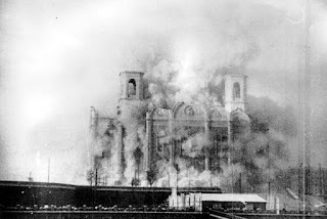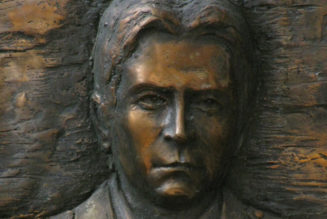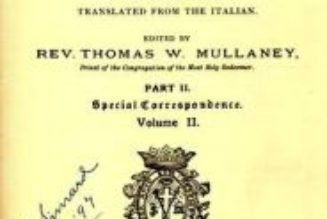
The Church Burns would be an English translation for the title of Andrea Riccardi’s recent book, La Chiesa Brucia. He began writing it after Notre Dame Cathedral in Paris was severely damaged by fire. The internationally renowned professor saw in the cathedral a symbol of the situation of the Church today in crisis…the Church burns. The book’s promotions make clear that people inside and outside the Church are aware of the crisis and worry that it represents a definitive decline of Christianity.
For all of us, the question is not: how do we restore Notre Dame? The question is: how do we restore the Church? After all, the Church is not a building in stone to be restored architecturally. It is Christ’s mystical body and God’s plan for the salvation of all men (cf. Ephesians 1).
The word “restore” often suggests making something as it was in the past. When a building is restored, it looks as it did in the past. But when the Church is restored, it will not look as it did in the past. All that belongs to its essential nature will be preserved. It will be one, holy, catholic, and apostolic. But its existential nature, how it operates in a contemporary and indifferent world, may be very different. We need to consider more deeply what “restore” means in a Christian context.
“To Restore All Things in Christ” is an English translation of the Latin phrase Instaurare Omnia in Christo. The phrase is a partial quotation of Ephesians 1:10 as rendered in the Vulgate of St. Jerome. It was the motto of Saint Pius X and, understood rightly, it refers to a part of every confirmed Christian’s personal mission.
English translations differ: they include “to sum up all things in Christ” and variations of “to restore all things in Christ.” The phrase belongs to one of the most theologically rich passages in one of St. Paul’s most theologically developed letters. There may be no better way to live as Christians than to center our mission on these words. We restore in Christ not only things outside of us, but even our own souls.
When we “work-out our own salvation in fear and trembling” (Phil 2:12), we do not return the image of God in our souls to the condition it was in when we were children. We develop it, bring it to “full maturity…and the full stature of Christ” (cf. Eph 4:13). We do not leave it as it is. We strengthen it daily in virtue (cf. 2 Pet 1:5) so that we abide more firmly in Christ. In this work we are guided by the Pauline understanding of instaurare.
To that end, we turn to the meaning of the original Greek word anakephalaiosasthai [a-na-ke-fa-lie-OH-sas-thigh], which Saint Jerome translates as instaurare. The meaning of the Greek word is an important corrective to those who might misunderstand what English translations, such as “restore all things in Christ,” are meant to convey. As the English noun “heading” is derived from “head”, the Greek noun kephalaion [ke-FA-lie-on] is derived from the Greek noun for “head”. It means “main point”. The verb kephalaiosasthai means giving the main point(s) of something, or summing it up. With the prefix ana-, which is like the Latin prefix re-, it has the sense of doing something over again.
Thus, the verb anakephalaiosasthai means recapitulating, giving a new—usually shorter—version that more clearly expresses the main point(s) of the original. It brings the main points to maturity. That is why St. Paul uses the verb in Romans 13:19 when he, following Our Lord, “sums up” (anakephalaioutai) the commandments with a single phrase, “to love one’s neighbor as oneself.”
In Saint Paul’s usage, anakephalaiosasthai also has a deeper meaning: it connotes bringing all that needs saving into the present by purifying and restoring it inside the healing power of integration with God’s plan in Christ. It means forgiveness, reconciliation, and a new beginning through Christ’s glorious power to bring good even out of evil and past mistakes. “Behold, I make all things new” (Rev 21:5).
All the “main points,” the best things in human history (individual and communal), need to be brought into Christ for their saving and proper realization. The process involves shedding the misunderstandings and ignorance of the past and finding a new way forward through Christ. In the Pauline tradition of Saint Irenaeus, recapitulating is about lifting every aspect of creation into a new synthesis through the Incarnation, death, and resurrection of Christ. It is about renewing our minds and hearts in Christ (cf. Rom 12:2).
We cannot, in fidelity to the tradition of Saint Thomas Aquinas, interpret instaurare omnia in Christo as calling for a retreat to the past. The Thomistic tradition is clear: “all truth is of the Holy Spirit.” The mission of the Church and each of her members, in heart and soul, is to recapitulate in the deeper sense of Saints Paul and Irenaeus, not to retreat into the past. Instaurare does not mean restoring the cultural make-up of church and state at the time of Trent (or earlier). It means gathering up again structures and fragments of goodness, gathering up new discoveries of authenticated knowledge, gathering and summing up all that makes humanity better, and producing day by day a stronger synthesis founded in the mystery of Christ and love of neighbor. “Therefore every scribe who has been trained for the kingdom of heaven is like a householder who brings out of his treasure what is new and what is old” (Mt 13:52).
Instaurare omnia in Christo means gathering all things in the daily Sacrifice of the Mass and implementing Christianity anew in today’s world. It means drawing the best from the political systems of yesterday and today. It means taking the best of today’s sciences and the revealed meaning of the imago Dei and directing them lovingly to the development of all of humanity for the glory of Jesus Christ. It is about a daily integration of faith and reason that renews each of them in the fullness of Christ’s revelation. It is what St. Thomas Aquinas did when he showed us “the right way to do theology” (Fides et Ratio, 43.3).
It is true: the Church burns. It is also true that the Holy Spirit enkindles in us the love of Christ which impels us to restore all things in Christ.
(Editor’s note: This essay appeared in a different form in December 2000 edition of Christendom College’s Instaurare Magazine.)
If you value the news and views Catholic World Report provides, please consider donating to support our efforts. Your contribution will help us continue to make CWR available to all readers worldwide for free, without a subscription. Thank you for your generosity!
Click here for more information on donating to CWR. Click here to sign up for our newsletter.
Join Our Telegram Group : Salvation & Prosperity







